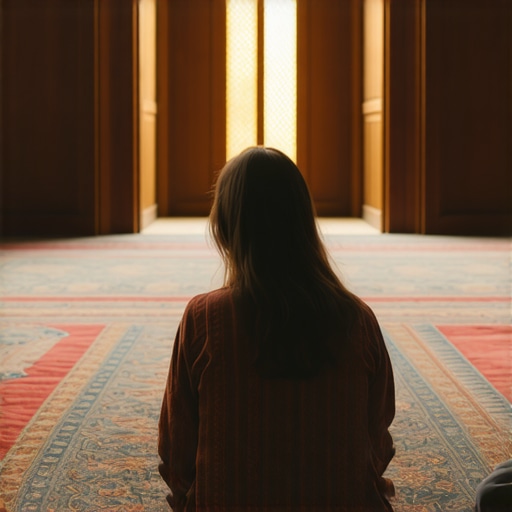My Personal Encounter with the Enigmatic Dream
Not long ago, I found myself in a recurring dream where I felt completely trapped, unable to break free. It was a surreal experience that left me pondering the profound spiritual messages embedded within it. As someone deeply interested in Islamic dream interpretation, I began to explore what being trapped in a dream could signify from an Islamic perspective.
Understanding the Spiritual Significance of Traps in Dreams
In Islamic dream symbolism, being trapped often reflects feelings of spiritual or emotional imprisonment in waking life. It might symbolize struggles with sins, doubts, or worldly attachments that hinder spiritual growth. The Quran and Hadiths offer insights into how dreams serve as divine messages, guiding us towards self-awareness and repentance. I learned that interpreting such dreams involves examining the context and emotions experienced during the dream itself.
How to Find Spiritual Freedom Beyond the Dream
To transcend the feeling of being trapped, I found that increasing piety and engaging in sincere dua (prayer) is essential. Reciting specific supplications, like reciting Quran, helps in seeking divine guidance and protection from spiritual hardships. Moreover, understanding the symbolism of dreams — for instance, consulting Islamic dream dictionaries — provides clarity. I was particularly struck by the interpretation that dreaming of a snake, often associated with deception or evil, might be a call to seek protection from harmful influences.
What Does Being Trapped in a Dream Really Mean in Islam?
Many scholars suggest that such dreams serve as wake-up calls, urging us to reflect on areas in our lives where we feel spiritually confined. According to Islamic dream interpretation, it might also indicate a need to confront fears or unresolved issues. Personal reflection and seeking Allah’s mercy can help in breaking free from these spiritual prisons.
If you’re experiencing similar dreams, I encourage you to keep a dream journal and consult knowledgeable scholars or trusted Islamic resources. Sharing your experiences and seeking advice can be immensely helpful. Remember, dreams are part of divine wisdom — a pathway to understanding ourselves better and drawing closer to Allah.
If this resonates with you, I invite you to share your own dreams or insights in the comments. Together, we can explore the spiritual depths of our subconscious minds and find true liberation through faith.
Unveiling the Hidden Layers of Dreams: A Deep Dive into Being Trapped
Dreams of feeling trapped can be unsettling, yet they often carry profound spiritual messages in Islamic dream interpretation. As I delved deeper into this subject, I realized that such dreams are not merely about physical confinement but symbolize inner struggles, doubts, or unresolved issues that hinder our spiritual progress. Islam emphasizes that dreams serve as divine messages, guiding believers towards self-awareness and repentance. Recognizing this symbolism requires paying attention to the emotions experienced during the dream and the context in which it occurs.
Symbolism of Confinement: Reflection of Inner Battles
In Islamic tradition, feeling trapped in a dream often points to spiritual or emotional imprisonment in waking life. It could reflect sins, doubts, or worldly attachments that distract us from our faith. The Quran and Hadiths highlight that dreams can be a means of divine communication, encouraging us to reflect on our spiritual state. Consulting trusted sources like the Islamic dream dictionary can shed light on specific symbols associated with this feeling, such as chains or walls, which may symbolize barriers we need to overcome.
What Does It Really Mean to Be Trapped in a Dream According to Islamic Scholars?
Scholars suggest that dreams of confinement are wake-up calls, urging us to examine areas where we feel powerless or constrained spiritually. For example, a dream about being imprisoned might symbolize a lack of progress in spiritual learning or feelings of guilt and remorse. It can also indicate unresolved conflicts or fears that need addressing through sincere dua and reflection. Engaging in supplications, such as reciting Quran, helps in seeking divine intervention and clarity.

Practical Steps for Spiritual Liberation from Inner Confinement
To transcend these feelings, increasing piety and actively seeking Allah’s mercy are vital. Regularly reciting specific duas and engaging in dhikr (remembrance) can uplift the soul and remove spiritual barriers. Additionally, understanding the symbolism behind dreams—such as the appearance of a locked door or a high wall—provides practical insights. Consulting Islamic dream interpretations, like dreams about pregnancy or losing teeth, can help you grasp what subconscious messages are being conveyed.
Could Dream Symbols of Barriers and Walls Indicate Spiritual Tests?
Indeed, walls, fences, or barriers in dreams often symbolize tests of faith or obstacles in spiritual growth. They may also represent the limits we place on ourselves due to fear or doubt. Recognizing these signs allows us to seek Allah’s help more earnestly. For instance, dreaming of a broken wall might signify that divine help is imminent, or that spiritual barriers are about to be lifted. Such interpretations align with prophetic insights found in sources like dreams about black color.
If you have experienced dreams of confinement, I encourage you to keep a detailed dream journal and consult knowledgeable scholars or trusted Islamic resources. Sharing your experiences can open pathways to spiritual healing and understanding. Remember, dreams are part of divine wisdom—an invitation to purify the heart and draw closer to Allah.
If this resonates with your journey, I invite you to leave a comment, share your own dreams, or suggest more readings that deepen our understanding of Islamic dream symbolism. Together, we can navigate the spiritual depths of our subconscious and find liberation through faith and trust in Allah’s mercy.
Reflecting on the Power of Dreams in Our Spiritual Journey
As I continue to explore the profound world of Islamic dream interpretation, I realize that each dream is like a sacred message tailored specifically for us. These visions often serve as guiding lights, illuminating paths we might not see clearly in our waking hours. My personal encounters, especially with dreams of confinement or being trapped, have transformed into opportunities for deeper self-awareness and spiritual growth.
Embracing Complexity: The Nuances of Dream Symbols in Islam
One aspect that has truly deepened my understanding is recognizing the complexity behind common symbols. For instance, a dream about a snake is not merely about deception; it can symbolize hidden enemies or spiritual tests. Consulting authoritative sources like Islamic dream dictionaries reveals layers of meanings that require careful reflection. This nuanced approach has helped me see dreams as multi-dimensional messages rather than simple signs.
Personal Practices for Interpreting Dreams with Faith and Wisdom
Over time, I found that maintaining a dedicated dream journal and engaging in consistent dua (supplication) enhances my ability to decipher divine messages. Reciting specific supplications, such as those found in reciting Quran, strengthens my connection to Allah and provides clarity. It’s a continuous journey of learning, patience, and trust that Allah’s guidance will unfold gradually.
How Can We Cultivate Spiritual Resilience Through Dream Interpretation?
What deeper questions should we ask ourselves when confronted with unsettling dreams like feeling trapped or confined?
These dreams often challenge us to examine our inner state—are we holding onto guilt, fear, or worldly attachments? In Islamic tradition, such visions are wake-up calls, prompting us to seek Allah’s mercy and purification. As I delve into this spiritual process, I realize that resilience is built through sincere repentance, increased piety, and trusting in Allah’s mercy. For example, engaging in dhikr (remembrance) and reciting relevant duas can serve as shields against spiritual hardships, transforming fear into faith.
Sharing our dreams and reflections with knowledgeable scholars or trusted community members can also foster collective spiritual growth. I encourage you to keep a record of your dreams and seek guidance from authentic Islamic sources. Remember, every dream, whether peaceful or troubling, is an invitation to draw closer to Allah and understand more about ourselves.
Inviting Personal Reflections and Community Sharing
Have you experienced dreams that left you pondering or seeking answers? I invite you to share your experiences and insights in the comments. Together, through dialogue and reflection, we can deepen our understanding of the divine messages embedded within our subconscious. Exploring these spiritual depths not only enriches our faith but also guides us toward greater harmony and inner peace.
Unraveling the Subtle Layers of Confinement: A Sophisticated Approach to Dream Symbols
As I delved into the complex world of Islamic dream interpretation, I discovered that feelings of being trapped often serve as multifaceted messages from the divine, urging us to examine the intricate web of spiritual and psychological barriers we unknowingly construct. These dreams are not superficial; they symbolize profound inner conflicts, unresolved guilt, or even societal pressures that compel us to seek divine clarity and self-awareness.
One compelling aspect I explored is the symbolism of walls and chains, which often appear in dreams as representations of spiritual stagnation or emotional repression. Consulting authoritative sources like Islamic dream dictionaries reveals layers of meaning—walls may indicate self-imposed limitations, while chains could symbolize unresolved attachments or sins that tether us to worldly distractions. Recognizing these symbols requires a nuanced understanding of both context and emotional response within the dream, emphasizing that interpretation is an art grounded in spiritual insight.
Advanced Questions: How Can We Use Dream Symbols to Detect Spiritual Tests and Opportunities for Growth?
Dream symbols like high walls or locked doors often signify divine tests designed to strengthen our faith and resilience. For instance, dreaming of a locked door might suggest a spiritual barrier that can be overcome through sincere supplication and patience. Conversely, a broken wall could herald divine intervention, signaling that obstacles are about to be lifted. Such interpretations align with prophetic insights, emphasizing that these visions are opportunities for spiritual refinement and trust in Allah’s wisdom. Engaging in targeted duas, such as reciting Quran, can facilitate divine assistance in overcoming these challenges.
Furthermore, developing a personalized dream analysis practice—keeping meticulous records, reflecting on emotional responses, and consulting trusted scholars—can deepen our understanding of these divine messages. This process transforms dreams from mere nocturnal images into powerful tools for spiritual growth and self-purification.
Harnessing the Power of Piety and Reflection to Transcend Confinement
My journey into advanced dream interpretation has shown me that cultivating piety and engaging in consistent dhikr are essential for spiritual liberation. Regular recitation of supplications, such as those found in reciting Quran, acts as a shield against spiritual hardships and helps realign the heart with divine purpose. Additionally, contemplating the symbolism of dreams—like the appearance of a locked gate or an insurmountable mountain—can reveal specific areas where divine help is needed most.
Understanding these symbols as tests or opportunities enables us to approach them with patience and reliance on Allah. For example, the image of a high wall might represent fears of failure or doubts about our spiritual capacity. Recognizing this, we can invoke Allah’s help through duas such as specific supplications and increase our acts of worship to strengthen our resilience.
Are Dream Symbols of Barriers and Walls Signposts of Divine Favor or Tests?
Dreams featuring barriers—be they walls, fences, or gates—are often signs of divine tests meant to assess our patience, trust, and submission to Allah’s decree. For example, a dream where one encounters a wall that suddenly collapses can symbolize divine mercy approaching after a period of spiritual hardship. Conversely, persistent barriers may indicate areas where we need to seek forgiveness, increase dua, and strengthen our connection to Allah. Recognizing these signs requires a deep understanding of prophetic teachings and the spiritual symbolism embedded in our subconscious.
If you find yourself frequently dreaming of confinement or barriers, I encourage you to maintain a detailed dream journal and seek insights from reputable Islamic scholars. This disciplined approach transforms dream interpretation into a journey of divine discovery, helping us unlock hidden messages and find pathways to spiritual emancipation.
Embracing Complexity: The Multi-Dimensional Nature of Dream Symbols in Islam
My personal exploration has revealed that symbols like snakes, walls, or doors are not static; they carry layered meanings that vary based on context, emotional tone, and personal circumstances. For instance, a snake may symbolize deception, spiritual tests, or even divine protection, depending on its appearance and behavior within the dream. Consulting comprehensive sources like dream dictionaries illuminates these complexities, enabling a more accurate and spiritually aligned interpretation.
This nuanced approach demands patience, reflection, and reliance on authentic knowledge, transforming our understanding of dreams into a profound spiritual practice that deepens our faith and self-awareness.
Things I Wish I Knew Earlier (or You Might Find Surprising)
1. Dreams Are Personal Messages from Allah
Initially, I thought dreams were just random images, but I’ve come to realize they can be divine messages tailored specifically for us, offering guidance and warnings in subtle ways.
2. Symbols Have Multiple Layers of Meaning
For example, a snake might symbolize deception, spiritual tests, or divine protection depending on the context. Understanding this nuanced symbolism deepened my appreciation for dream interpretation.
3. Emotions During Dreams Are Key
The feelings we experience in dreams reveal much about their true meaning. A feeling of being trapped, for instance, often points to inner spiritual struggles that need attention.
4. Consistency and Record-Keeping Enhance Understanding
Keeping a dream journal helps track recurring themes and messages, making it easier to seek guidance from knowledgeable sources and reflect on personal growth.
5. Not All Dreams Are Equal — Recognize the Different Types
Islamic tradition distinguishes between true dreams, false dreams, and those from Shaytan. Learning to identify them is crucial for accurate interpretation and spiritual protection.
6. Supplication and Piety Play a Role
Engaging in dua and increasing piety can influence the clarity and positivity of dreams, helping us receive divine guidance more effectively.
Resources I’ve Come to Trust Over Time
- Islamic Dream Dictionary: A comprehensive source that offers detailed interpretations of various symbols, helping me decode dreams with confidence.
- Al-Nabulsi’s Dream Interpretation: A classical Islamic scholar whose insights provide profound spiritual understanding, making dreams more meaningful.
- Online Islamic Forums and Scholars: Trusted communities where I’ve learned to differentiate between true and misleading dream interpretations.
- Reciting Quran and Sunnah: Regular recitation enhances spiritual connection, which reflects positively in dreams and helps clarify their messages.
Parting Thoughts from My Perspective
Reflecting on my journey with Islamic dream interpretation, I realize that dreams are powerful tools for spiritual growth and self-awareness. They carry layered meanings that require patience, piety, and sincere seeking of Allah’s guidance. If you’re exploring this path, remember that maintaining a humble heart and seeking divine help is key. I encourage you to keep a dream journal, consult trustworthy sources, and share your experiences—because every dream offers a unique opportunity to draw closer to Allah. If this resonated with you, I’d love to hear your thoughts or stories in the comments. Sharing our insights can deepen our understanding and strengthen our faith.




This post truly resonated with me because I recently experienced a dream where I felt completely trapped inside a high wall. It made me reflect on the internal barriers that might be holding me back spiritually. I appreciate the emphasis on using dua and prayer as ways to seek divine help, especially reciting Quran, which has always been a source of comfort for me in times of spiritual struggle. I wonder, how do others differentiate between fear driven by worldly attachments versus deeper spiritual stagnation when interpreting such dreams? Engaging in sincere reflection and seeking Allah’s guidance are essential. I’ve found that keeping a dream journal helps me identify recurring themes and emotional responses that guide my spiritual journey. Has anyone experienced a breakthrough after identifying specific symbols like walls or chains in their dreams? Would love to hear more insights on overcoming these internal conflicts and translating dreams into actionable spiritual growth.
Reading your detailed exploration of dreams, especially feeling trapped, really struck a chord with me. I’ve personally had dreams where I felt confined behind walls or within locked gates, and each time, it prompted me to reflect on my spiritual state. I found that increasing my acts of worship and heartfelt dua, particularly asking Allah for guidance and relief, gradually helped me feel freer spiritually. One thing that stood out to me is the symbolism of walls as self-imposed limitations—sometimes, our fears or doubts create these barriers more than external circumstances. I’ve learned that consistent supplication and sincere repentance are powerful tools to break through these mental and spiritual walls. How have others managed to overcome these internal barriers in their real-life situations? Are there specific duas or practices that have been especially effective in your experience? I believe that recognizing these symbols is a crucial step in the journey toward spiritual liberation and strengthening our trust in Allah’s mercy.
This post beautifully highlights the profound spiritual messages hidden within dreams of being trapped. I’ve personally experienced similar dreams during times of spiritual testing, where walls or chains appeared in my visions. Such dreams, from an Islamic perspective, often serve as important reminders that our inner state heavily influences our external circumstances. I’ve found that consistent dua, especially asking Allah for ease and protection, along with sincere Tawbah, helps me overcome these feelings of confinement. I am curious, how do others interpret the symbolism of dark or shadowy figures in dreams? Could they sometimes represent subconscious fears or unresolved issues that we need to address? Sharing these experiences can truly deepen our understanding and strengthen our faith. I agree with the importance of keeping a dream journal; it’s amazing how patterns and messages emerge when we reflect regularly. For anyone struggling with recurring feelings of being trapped, remember that Allah’s mercy is boundless, and turning to Him in dua can open pathways for spiritual liberation and peace.